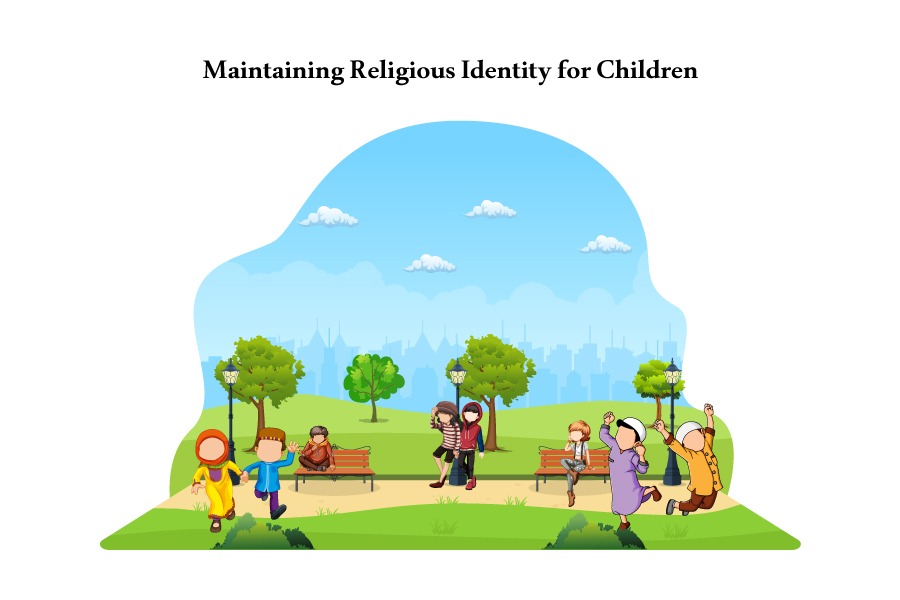Religious identity holds significant importance in the lives of individuals, providing a sense of belonging, purpose, and moral guidance. It refers to the affiliation and identification of an individual with a particular religious belief system. It encompasses a person’s religious beliefs, practices, values, and rituals. In Islam, it is not merely a personal choice but an integral part of a Muslim’s life. It influences their actions, relationships, and overall lifestyle.
What is the role of family and society in the Formation of Religious Identity?
The formation of religious identity in Islam is a multifaceted process influenced by various factors. Firstly, the family plays an important role in the formation. From a young age, children are introduced to Islamic teachings, principles, and rituals, which lay the foundation for their religious identity. The family environment fosters a sense of belonging and guides adhering to religious practices.
In addition to the family, the Muslim community and peer influence contribute to the formation of identity. Interacting with fellow Muslims, attending mosques, and participating in communal prayers strengthen one’s connection to Islam. Peer relationships provide a platform for shared experiences, discussions, and the reinforcement of Islamic values.
However, it is not solely shaped by external factors. Personal conviction and faith are essential elements in the development of religious identity. Muslims should seek knowledge, explore the teachings of Islam, and develop a personal relationship with Allah. This personal conviction forms the basis of their religious identity, motivating them to uphold their beliefs and values.
Manifestation of Religious Identity
Islamic identity encompasses several key elements, including:
- Belief in the six pillars of faith, which include belief in Allah, His angels, His books, His messengers, the Day of Judgment, and divine destiny.
- Muslims engage in acts of worship to express their devotion to Allah. This includes performing the five pillars of Islam, namely the declaration of faith (Shahada), prayer (Salah), giving to charity (Zakah), fasting during Ramadan (Sawm), and pilgrimage to Mecca (Hajj) for those who are able.
- Muslims are encouraged to uphold values such as honesty, kindness, justice, compassion, and humility in all aspects of their lives.
- Muslims consider themselves part of a global community known as the Ummah. This sense of unity transcends geographical and cultural boundaries and fosters a sense of brotherhood and sisterhood among Muslims.
- Islamic religious identity places great emphasis on actively contributing to society, helping the needy, promoting justice, and being actively engaged in creating a positive impact in their communities.
What are the Challenges to Religious Identity?
Despite the significance of religious (Islamic) identity, Muslims face various challenges in maintaining and preserving it.
-
Islamophobia and Stereotypes
Islamophobia and stereotypes often lead to discrimination, criticism, and the questioning of one’s religious beliefs. Such challenges can cause Muslims to face difficulties in openly practicing their faith and expressing their identity.
-
Cultural Assimilation
Balancing religious values and cultural norms can sometimes create conflicts, making individuals question their religious identity. The pressure to conform to societal expectations and assimilate into the dominant culture may pose challenges to practicing Islam authentically.
-
Spiritual Crisis
Internal struggles and doubts can also arise within individuals, impacting their religious identity. Muslims may face periods of spiritual crisis, questioning their faith, and grappling with doubts. Addressing these internal struggles is crucial in strengthening and reaffirming religious identity.
How to Strengthen Religious Identity?
To strengthen their religious identity, Muslims undertake several measures.
- Seeking knowledge and education about Islam plays a vital role in deepening understanding and strengthening religious identity. Studying the Quran, Hadith (sayings of the Prophet Muhammad), and Islamic literature enables Muslims to gain a comprehensive understanding of their faith and solidify their identity.
- Engaging with the Muslim community is another way to strengthen identity. Active involvement in local mosques, Islamic centers, and community events fosters a sense of belonging and provides opportunities for mutual support and growth. Interacting with fellow Muslims who share similar values and beliefs reinforces one’s identity.
- Moreover, spiritual practices and self-reflection contribute to the strengthening of religious identity. Engaging in prayer, reciting the Quran, and engaging in personal reflection enable Muslims to connect with Allah on a deeper level. These practices nurture a stronger sense of faith and reinforcen identity.
Conclusion
Religious identity, particularly from an Islamic point of view, holds great significance in the lives of Muslims. It shapes their beliefs, behaviors, and values, providing them with a sense of purpose and belonging. Understanding the formation, expression, challenges, and ways to strengthen religious identity is essential in fostering a strong and resilient Muslim community.
















